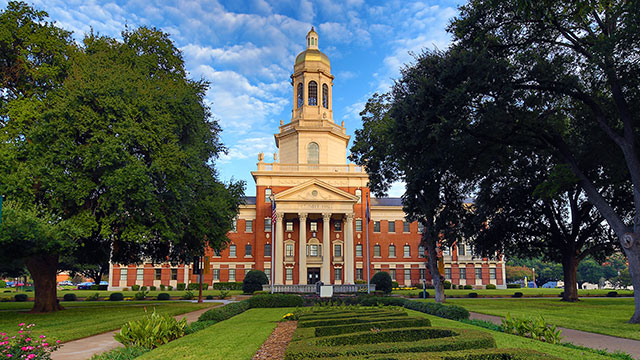

Baylor University recently became a Research 1 (R1) university. This means that the Carnegie Classification of Institutions of Higher Education has recognized the school for its commitment to research and doctoral studies. Texas now has ten R1 institutions: UT-Austin, UT-Dallas, UT-Arlington, UT-El Paso, UT-San Antonio, Texas A&M University, Texas Tech University, University of Houston, University of North Texas and Rice University.
But what does becoming an R1 institution mean for Baylor University’s Christian identity? In November, Baylor president Linda Livingstone wrote that a recent $1.1. billion campaign has positioned Baylor to “dynamically expand our institutional impact through groundbreaking research and creating solutions to the challenges confronting our world, while also deepening our commitment to our Christian mission….”
Over at the Waco Tribune, Perry Glanzer, an educational foundations professor at Baylor and the editor of Christian Scholars Review, is concerned about what the move to R1 might mean for Baylor’s Christian mission.
Here is a taste of his piece:
…Baylor’s faculty development regarding the Christian mission has for years mimicked the worst kind of Baptist church polity. In some Baptist churches, leaders are only concerned with public professions of faith, but there is little interest in “discipleship.” Baylor’s approach to faculty is similar. Leaders expect a public profession of faith from prospective faculty in an interview with the provost’s office and as long as you make such a profession, you’re in. Baylor provides little guidance, however, about what Christian teaching, mentoring or research might involve once professors arrive on campus — or accountability, reward or incentives for engaging in Christian service and scholarship.
The reality is, when it comes to faculty formation, the Christian mission is not a high priority at Baylor University, compared to other goals like becoming an elite “R1” research institution. Thus, although millions have been poured into helping Baylor become R1, there are no specific financial incentives to help faculty do Christian scholarship, learn more about Christian teaching (versus teaching and learning in general) or to encourage Christian service. Moreover, there is no clarity about what “Christian” even means at Baylor, despite the administration’s constant insistence that our school is “unambiguously Christian.”
Full-time faculty who make it through the administrative interview are never held accountable for the Christian mission on annual reviews or tenure. Of course, the carrot is much better than the stick for Christian faculty development. Although Baylor has excellent resources for faculty development in scholarship, teaching and service, it does not provide specific incentives for Christian development in these areas. Furthermore, deans and chairs have no incentives to take the Christian mission seriously. In my experience many of those leaders do not do so, or simply do not know how to cultivate a Christian mission, since it is vaguely defined, not part of accountability structures and not incentivized or rewarded.
Baylor’s commitment to R1 also means that more graduate students teach courses and these graduate students do not have to profess some sort of Christian faith to teach at Baylor. Furthermore, this past fall Baylor hired 616 adjunct faculty members — in fall 2020 it was 437. The adjunct faculty also do not have to be Christian. Thus, if students have a significant number of graduate students or adjuncts for professors, they may have few committed Christian teachers, even though their families thought they were paying for a Christian education.
Read the entire piece here. The work of sustaining Christian identity at colleges and universities is difficult even at the smallest of schools. I can’t imagine how one does it a Research 1 university.